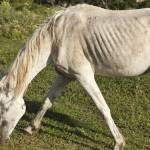Body Condition Score Predicts Survival Rate of Malnourished Horses

Starvation of otherwise healthy horses remains a widespread welfare concern. Veterinarians must administer care and assess survival chances of starved horses, as rehabilitation requires considerable time and financial resources. A recent study set out to determine if certain clinical markers at first veterinary assessment could reliably predict a survival outcome after 100 days of refeeding.*
In this retrospective study, researchers from the University of Tennessee’s College of Veterinary Medicine reviewed medical records of starved horses presented to their clinic over an 11-year period. To be included in the study, horses had a body condition score of 3 or less on the 1-9 Henneke scale and a diagnosis of malnutrition at admission. Other data recorded, if available, included vital signs, complete blood count data, blood chemistry panels, parasite burden, and refeeding information.
Body condition score proved the only clinical marker associated with probability of survival after hospitalization. According to researchers, “for every one whole number unit increase in the body condition score, the odds to live increased 14.6 times.” All of the horses with a body condition of 2.5 or 3 survived, and all but one of the horses with a body condition score of 2 lived. Researchers, however, observed reduced survival rates for horses with a body condition score of 1 and 1.5, both near 60%. This result coincides with an earlier study that identified body condition score as a potential indicator of death in malnourished animals.+
“I encourage horse owners to be familiar with the body condition scorecard and to score their own horses every week or so. For horses prone to metabolic disease, for example, recognizing weight gain and implementing strategies to defer further gain prove critical,” said Catherine Whitehouse, M.S., a nutrition advisor with Kentucky Equine Research.
“On the opposite end of the spectrum, as this study shows, assessing body condition of neglected horses acts as an accurate measure of whether a horse can overcome starvation. When a horse owner is familiar and comfortable using the scorecard, then she has an opportunity to act when a horse slips from a score of 5 to 4 or, worse, from 4 to 3. There’s time to reevaluate the diet and make necessary changes without placing the horse in peril,” she said.
One obstacle in nourishing horses back to health is the possibility of refeeding syndrome, a condition that occurs after a period of starvation or fasting particularly when high amounts of nonstructural carbohydrates are fed in the beginning days of recovery. Refeeding syndrome causes irregularities in fluid balance and glucose metabolism as well as whole-body mineral imbalances, including phosphorus, potassium, and magnesium deficiencies. To avoid refeeding syndrome, malnourished horses should be placed in the care of a veterinarian. If access to a nutritionist is available, they too may become a valuable part of the care team.
“Few people have to deal with horses on the low end of the body condition scorecard, the 1s and the 2s,” said Whitehouse. “Not all starved horses are lost cases. Despite the hardships placed upon them, some make full recoveries, as this study demonstrates, and become companions and useful working horses.”
Research such as this provides veterinarians with valuable information that can be passed on to animal advocacy groups, law enforcement, and court officials, all of whom must interact with owners or caregivers in an effort to make the best decision for the horses.
*Schneider, L.G., A.C. Self, M.T. Hines, and J.L. Ivey. 2021. Clinical factors associated with survival outcomes in starved equids: A retrospective case series. Journal of Equine Veterinary Science 10:103370.
+Whiting, T.L., R.H. Salmon, and G.C. Wrunk. 2005. Chronically starved horses: Predicting survival economic and ethical considerations. Canadian Veterinary Journal 45:320-324.








